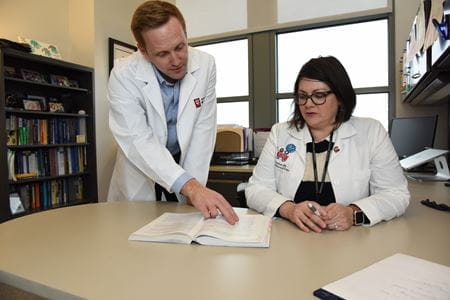The chances of meeting someone who’s been affected by the opioids crisis is incredibly high, particularly in rural communities. In Indiana alone, more than 1,700 people died from opioid-related overdoses in 2017.
Last year, Indiana University School of Medicine, Prevention Insights at the IU School of Public Health-Bloomington and IUPUI’s Fairbanks School of Public Health partnered to offer a program funded by the Indiana Family and Social Services Agency (FSSA) where clinicians and health workers across the state could have access to training and learn how to treat complex health conditions related to opioid use through telemedicine. The Extension for Community Healthcare Outcomes (ECHO) program, was initially developed a decade ago at the University of New Mexico Health Sciences Center.
Physicians in rural parts of the state have been able to witness how opioid use disorder ECHO program is transforming the way they treat patients and how it’s also changing their communities.
“To understand the extent the opioid epidemic has impacted Indiana, just ask your neighbor,” said Diane Begley, MD, an IU School of Medicine graduate and family physician based in Lafayette. “This epidemic isn’t a surreal experience because it’s happening right here at home.”
For Begley, the opioid ECHO program has allowed her to be more comfortable in treating patients.
“How we approach and deal with pain is very subjective,” Begley said. “Often times, it can’t be ignored and rarely do any two people cope with pain the same way. Being involved with the opioid ECHO program and having access to specialists who can share their point of view is incredibly rewarding.”
Launched last year, the opioid use disorder ECHO program’s free-to-use and high-impact training intervention links community-based clinicians with an inter-disciplinary team of expert specialists led by IU School of Medicine. In weekly sessions, experts like Leslie Hulvershorn, MD, Zachary Adams, PhD and Andy Chambers, MD mentor and share their knowledge with brief lectures and case-based learning using videoconferencing technology, enabling primary care providers to treat patients with opioid use disorder in their own communities.
“The reason I’m involved in ECHO is because there are no easy solutions to the opioid crisis,” said Rex Allman, MD, a physician based in Winamac. “Even with our small population, we’re one of the most afflicted in Indiana by this epidemic.”
After medical school and training, Allman returned to the small Hoosier town because of his desire to be a member of a community.
“It’s important to me to work together with my neighbors,” Allman said. “It’s challenging to see so many people in my community affected by this crisis, but ECHO has empowered me in medication-assisted treatment and has made it easy to access expertise, from addiction specialists and pharmacists to members from the legal community and counselors.”
In the face of the opioid epidemic patients lack reliable access to treatment, in part, due to insufficient numbers of clinicians trained in the treatment of opioid abuse. There is a shortage of psychiatrists, addiction specialists and primary care providers in Indiana who are equipped to deliver medication-assisted treatment to opioid abuse patients.
According to Carolyn Warner-Greer, medical director of the Fort Wayne-based Bowen Recovery Center and an IU School of Medicine graduate, there is no time for physicians to wait.
“The limitation many primary care physicians face is a lack of training, and ECHO is helping to bridge that gap,” Warner-Greer said. “So many patients are waiting months to receive treatment for opioid use. You would never see these lengthy wait times for any other chronic illness. It’s as if the patient has entered a wrong door toward their care when there shouldn’t be any wrong doors.”
Warner-Greer said that removing the stigma from seeing treatment for substance abuse is a good place to start—though it can’t all happen in a doctor’s office.
”It all starts with identification which won’t begin with specialists like me; it’s going to happen in our homes and schools; it’s going to be by our counselors, employers and primary care providers; it’s going to be by removing the punitive approach which hasn’t led to successful outcomes in health or access for treatment,” Warner-Greer said. “If more clinicians knew about ECHO, they would see how any physicians, regardless of their specialty, can receive training in addiction medicine.”
The ECHO model emphasizes an “all teach, all learn” philosophy. In addition to learning about clinical management of opioid use disorder from specialists, community-based clinicians inform experts as best practices emerge while also learning from fellow clinicians across the state. The model itself is already causing a ripple effect in Columbus, as one physician has used the education gained through ECHO to establish an addiction treatment center.
“ECHO has been a critical part in making this a reality,” said Kevin Terrell, DO. “The program has instilled in me a comfort level where I’m now the expert in addiction medicine for my entire health system. It’s helped me to understand what I need to know to be the best provider I can be.”
“ECHO will allow us to give clinicians the tools they need to provide excellent care to patients affected by the opioid epidemic,” said Thomas McAllister, MD, chair of the Department of Psychiatry at IU School of Medicine. “It’s a chance to improve communication among Indiana’s health care professionals and bring life-saving treatments to rural areas.”
Learn about the opioid use disorder ECHO program and its subject-matter experts.




